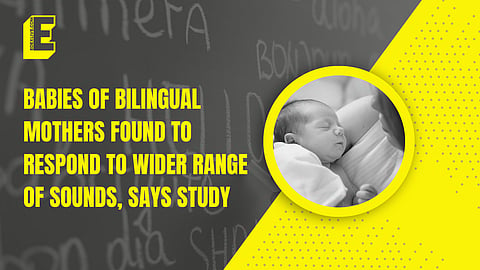

A new study from Spain shows that newborns of multilingual moms respond to a wider range of sound pitches than those of mothers who speak only one language.
Researchers believe that newborns in the wombs of bilingual mothers will be exposed to a wider range of sounds than babies in the wombs of monolingual mothers, PTI reports.
The researchers discovered that, while the brains of monolingual mothers learned to respond in a heightened manner to the pitch of one language, the brains of bilingual mothers appear to have become sensitive to a broader range of pitches, without responding in a heightened manner to any of them.
The findings appear in the journal Frontiers in Human Neuroscience.
According to studies, the global bilingual population ranges between 43 per cent and more than 50 per cent, with bilingualism or multilingualism the norm in many nations.
"Languages vary in the timing aspects of speech, such as rhythm and accentuation, but also pitch and phonetic information. This means that fetuses from bilingual mothers are expected to be immersed in a more complex acoustic environment than those from monolingual mothers," said co-corresponding author Carles Escera.
Escera is a professor at Sant Joan de Déu Barcelona Children's Hospital, where the researchers recruited mothers of 131 newborns aged one to three days for the study.
According to a poll, 41 per cent of mothers indicated they spoke only Spanish or Catalan, a language similar to Spanish and spoken in Catalonia in eastern Spain.
The remainder were multilingual, with the majority of them speaking Spanish and Catalan.
A few bilingual mothers also spoke Arabic, English, German, and Portuguese.
The researchers assessed the babies' responses to four types of sounds lasting 0.25 seconds.
The sounds were vowels from both Spanish and Catalan.
"Here, we show that exposure to monolingual or bilingual speech has different effects at birth on 'neural encoding' of voice pitch and vowel sounds: that is, how information about these aspects of speech has been initially learned by the foetus," said co-first author Natàlia Gorina-Careta, a researcher at the University of Barcelona.
"At birth, newborns from bilingual mothers appear more sensitive to a wider range of acoustic variation of speech, whereas, newborns from monolingual mothers seem to be more selectively tuned to the single language they have been immersed in," said Gorina-Careta.
According to Escera, the findings highlight the need to expose foetuses to language for them to recognise speech sounds at birth.
However, the "sensitive" phase for language development lasts long beyond birth, so experiences after birth may overwhelm the first changes in the womb, according to the researchers.
